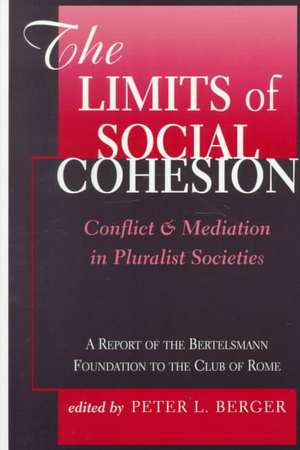The Limits Of Social Cohesion: Conflict And Mediation In Pluralist Societies
Autor Peter L. Bergeren Limba Engleză Paperback – 14 mai 1999
| Toate formatele și edițiile | Preț | Express |
|---|---|---|
| Paperback (1) | 427.16 lei 6-8 săpt. | |
| Taylor & Francis – 14 mai 1999 | 427.16 lei 6-8 săpt. | |
| Hardback (1) | 1234.82 lei 6-8 săpt. | |
| Taylor & Francis – 13 sep 2019 | 1234.82 lei 6-8 săpt. |
Preț: 427.16 lei
Preț vechi: 502.54 lei
-15% Nou
Puncte Express: 641
Preț estimativ în valută:
81.73€ • 85.34$ • 67.65£
81.73€ • 85.34$ • 67.65£
Carte tipărită la comandă
Livrare economică 05-19 aprilie
Preluare comenzi: 021 569.72.76
Specificații
ISBN-13: 9780813367194
ISBN-10: 0813367190
Pagini: 416
Ilustrații: black & white illustrations
Dimensiuni: 152 x 229 x 24 mm
Greutate: 0.45 kg
Ediția:1
Editura: Taylor & Francis
Colecția Routledge
Locul publicării:Oxford, United Kingdom
ISBN-10: 0813367190
Pagini: 416
Ilustrații: black & white illustrations
Dimensiuni: 152 x 229 x 24 mm
Greutate: 0.45 kg
Ediția:1
Editura: Taylor & Francis
Colecția Routledge
Locul publicării:Oxford, United Kingdom
Cuprins
Preface -- Preface -- Introduction -- The American Culture War -- The Past in the Present: Redefining Laïcité in Multicultural France -- Normative Conflicts in Germany: Basic Consensus, Changing Values, and Social Movements -- Uncertain Ghosts: Populists and Urbans in Postcommunist Hungary -- Revolution from the Top and Horizontal Mediation: The Case of Chile's Transition to Democracy -- South Africa: Normative Conflicts, Social Cohesion, and Mediating Institutions -- Some Notes on Normative Conflicts in Turkey -- Islamic Tolerance: The Struggle for a Pluralist Ethics in Contemporary Indonesia -- The Conflict of Norms and Values in Contemporary Indian Society -- Normative Conflicts in Japan -- Normative Conflicts in Contemporary Taiwan -- Conclusion: General Observations on Normative Conflicts and Mediation -- Executive Summaries
Notă biografică
Peter L. Berger is director of the Institute for the Study of Economic Culture at Boston University.
Descriere
This report is the result of years of cooperation between the Club of Rome and the Bertelsmann Science Foundation. It gives a better understanding of the limits to social cohesion and the increasing role of intermediate institutions or of individual leaders in the mediation of normative conflicts.












